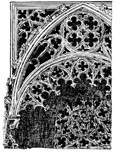
A First Reckoning With the Latin Mass
SO MUCH LIFE PACKED WITH SO MUCH QUIET
“Now in the morning Mass you do all that the race needs to do and has done for all these ages where religion was concerned; there you have the sacred and separate Enclosure, the Altar, the Priest in his Vestments, the set ritual, the ancient and hierarchic tongue, and all that your nature cries out for in the matter of worship.” — Hilaire Belloc, The Path to Rome
It is not often that one has a chance in life to experience a moment that brings into focus all the dimensions of one’s Catholic faith — its height, depth, width, and breadth. For me, that moment came when I assisted in my first Tridentine Latin Mass — otherwise known as the Mass According to the Rite of 1962. I grew up a typical “cradle Catholic” in the wake of the Second Vatican Council and the subsequent dismantling of Catholic culture, with only my parents’ say-so that the Latin Mass ever even existed. For me, growing up Catholic involved no more and no less than the comfortable notions of the faith that accompanied me all the days of my adolescence and early adulthood. In my school days, Catholicism was a matter of generic adherence, not of particular assent — nor the attendant suffering which Christ promised such assent would involve (Mt. 10:16-23).
This all changed, though, once I left home. Except for a brief, forgettable stint at a state university, I spent my college days steeped in Catholicism by attending Thomas Aquinas College (TAC) in Santa Paula, Calif. With a Great Books curriculum, TAC seeks to nourish its students on the substance of real intellectual formation — theology, philosophy, literature, science, and mathematics — as taught by the literary architects of Western Civilization, that is, Aquinas, Augustine, Aristotle, Euclid, Homer, Plato, and so on. The school also places a rigorous emphasis on learning the tongue of Mother Church: Latin. This particular fact becomes important to one’s spiritual life at TAC because the Mass — whether Novus Ordo or 1962 — is celebrated exclusively in Latin. Unless you know your Latin (two years of it, starting freshman year), your participation in the Mass is reduced to scurrying through the bilingual missal which the College provides to keep up with priest and faithful.
When I was there, Mass was celebrated in the tiny little chapel tucked away in the corner of the college commons hall (the school is now building a place of worship more suitable for God and man; the reason for the delay is a story for another day). The Tridentine Latin Mass was celebrated the last Sunday of the month by permission of the ordinary under whose jurisdiction the College operates. Before ever having attended the Latin Mass, I had heard both good things and bad about it. But as I beheld the humble nobility of the actual thing for the first time, polemics on either side seemed to fall away like scales.
You May Also Enjoy
"It is our duty to be vigilant... Because, in the end, the people will assist at the Tridentine Mass and our churches will empty."
The totality of the atmosphere of the liturgy chiefly determines whether or not it will lift believers toward the mysteries of God and eternal life.
The following blessing is recited every day by Jews: "Blessed are You, L-rd our G-d, King of the Universe, who did not make me a Gentile."

